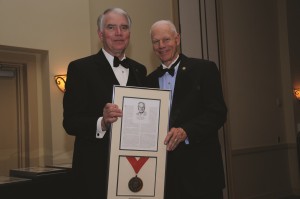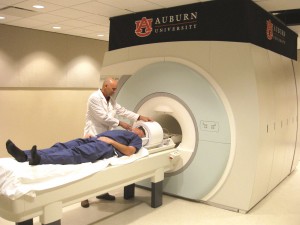The State of Alabama Engineering Hall of Fame honors the outstanding accomplishments of individuals, corporations, institutions and projects that bring significant recognition to the state. The 2015 induction ceremony was held in Auburn in February with five individuals and three projects being recognized, including three Auburn alumni that serve as outstanding representatives of the College of Engineering, as well as the Auburn University MRI Research Center.
Michael DeMaioribus earned bachelor’s and master’s degrees in electrical engineering from Auburn in 1976 and 1977, respectively, where he received the president’s award as the outstanding engineering graduate. After graduation, he joined Dynetics in Huntsville, Alabama, as an engineer charged with evaluating the effectiveness of foreign air-defense radars against U.S. aircraft.
![kat hof[5]](http://ecm.eng.auburn.edu/wp/emag/files/2015/05/kat-hof5-300x200.jpg)
In 2013, DeMaioribus was promoted to executive vice president of business operations over what is now a $300 million company. He is responsible for financial and material tracking systems necessary to manage large part inventories and in-house labor costs, along with subcontractor costs. He is also responsible for contracts, information technology, security, human resources and facilities.
DeMaioribus serves on the Auburn University Board of Trustees. He is the past chair of both the Auburn Alumni Engineering Council and the Department of Electrical and Computer Engineering Industrial Advisory Board. DeMaioribus has received the Distinguished Auburn Engineer Award and has been named an Outstanding Alumnus of the Department of Electrical and Computer Engineering.

J. David Irwin has remained at the forefront of engineering as both a technology innovator and pioneering educator for more than 45 years. He earned a bachelor’s degree in electrical engineering from Auburn in 1961 and master’s and doctoral degrees from the University of Tennessee in 1962 and 1967, respectively. After a brief stint at Bell Telephone Laboratories, where he was promoted to a supervisor, Irwin returned to Auburn as an assistant professor in 1969.
His keen ability to effectively teach and mentor students, while also leading research, led him to be selected as head of the Department of Electrical Engineering in 1973. Irwin became a full professor in 1976 and was named the Earle C. Williams Eminent Scholar in 1993. During his time as department head he initiated projects that strengthened Auburn’s prominence in engineering, including developing a strong faculty active in the Institute of Electrical and Electronics Engineers (IEEE), securing a new building for the department and establishing the second microelectronics laboratory in the Southeast for teaching and research. He was also instrumental in developing the nation’s first accredited wireless engineering degree program at Auburn.
Irwin is the author of “Basic Engineering Circuit Analysis,” a textbook now in its 11th edition and considered one of the top three in the field. He also co-authored the textbook “Introduction to Computer Networks and Cybersecurity.” Recently published, it is already considered one of the most comprehensive texts in this emerging area of technology. Irwin’s research and development achievements in signal processing, as well as his development of a system for protecting against denial of service attacks, have significantly increased internet security in this country.
Irwin has received IEEE’s highest award for education, the James H. Mulligan Jr. Education Medal. In addition, the IEEE Industrial Electronics Society created the J. David Irwin Early Career Award in recognition of the many contributions Irwin has made to the development of young professionals. He is an IEEE life fellow, as well as a fellow of the American Society for Engineering Education and the American Association for the Advancement of Science. He has received the Distinguished Auburn Engineer Award and Auburn University’s Presidential Award for Excellence.
Joseph (Buzz) Miller is leading an ambitious project to build the first two nuclear reactors in the United States in more than 30 years, an effort that will supply power to the Southeast for generations. As president of nuclear development for Southern Nuclear and executive vice president of nuclear development for Georgia Power, Miller oversees construction of Vogtle 3 and Vogtle 4, two new nuclear reactors at the Alvin W. Vogtle Electric Generating Plant in eastern Georgia.
He earned a bachelor’s degree in chemical engineering from Auburn in 1983 and began his career in Alabama in the oil-field and power-plant service industries before joining Alabama Power in 1986 in the chemistry and environmental support section of nuclear generation.
After a series of assignments at Alabama Power and Southern Nuclear, he became federal regulatory affairs manager of Southern Company in Washington, where he also served for a year at the Nuclear Energy Institute as acting vice president of legislative affairs. In 1998, he was named assistant to Bill Dahlberg, CEO, president and chairman of Southern Company. A year later, he was elected vice president for government relations, responsible for managing the company’s Washington staff and its efforts with Congress and agencies of the executive branch. In 2006, he was elected to his current position.
The $14 billion Plant Vogtle project is groundbreaking in its goal to expand nuclear power in the U.S., and Miller has spearheaded the effort every step of the way. His management and leadership resulted in the Nuclear Regulatory Commission issuing the first nuclear combined construction and operation license in more than three decades. His activity in the project ranges from directing negotiations for the plant’s first contracts to implementing organizational designs and models for nuclear development that ensure continued success of the project’s safety, quality, cost and schedule.
Miller also supports engineering education at Auburn. He helped establish the Nuclear Power Generation Systems program in the Samuel Ginn College of Engineering, and also serves on the Auburn Alumni Engineering Council. He is a member of Auburn Engineering’s Ginn Society for his philanthropic contributions to the college.

The Auburn University MRI Research Center advances critical technology required to solve complicated medical challenges, meets society’s health care needs and improves economic growth in Alabama. Opened in November 2010, the $20 million, 45,000-square-foot facility houses two of the most powerful research and clinical magnetic resonance imaging (MRI) scanners in the world. The Siemens Verio open-bore 3 Tesla scanner is the most powerful MRI certified by the Federal Drug Administration for clinical use. The Siemens 7 Tesla MRI scanner is the nation’s third actively shielded, whole-body scanner and is one of only three 7T scanners located in the Southeast, and one of less than 20 such scanners in the United States.
The center, which sits in the Auburn University Research Park and is overseen by the Samuel Ginn College of Engineering, enhances health care in the region as engineers work alongside technicians and scholars in a unique environment. Leased space in the center is devoted to area medical clinicians, including a neurosurgeon specializing in minimally-invasive management of brain tumors and brain and spinal cord trauma. The center also houses an orthopedics and sports medicine practice, as well as an outpatient physical therapy group.
Auburn Engineering researchers are collaborating with counterparts at Auburn’s College of Veterinary Medicine in a federally funded study of how dog’s brains process smells in an effort to improve training of detector dogs, as well as another study of how a dog’s brain reacts to human emotions. Researchers from engineering and psychology also work with the U.S. Army Aeromedical Research Laboratory in Fort Rucker, Alabama, and the Walter Reed National Military Medical Center to study the structures and activity of the brains of soldiers returning from Iraq and Afghanistan in an attempt to better understand post-concussion syndrome and post-traumatic stress disorder.
Auburn is also partners with the University of Alabama at Birmingham (UAB) in a project to improve detection of early onset schizophrenia. In another partnership with UAB, the center provides the core for patient-centered studies on specific types of heart disease.